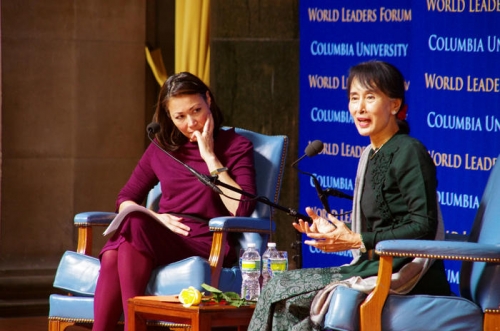This past Saturday Daw Aung San Suu Kyi, chair of the National League for Democracy, Member of Burmese Parliament, and recipient of the 1991 Nobel Peace Prize, spoke with NBC News anchor Ann Curry about Burma’s future at the Columbia University World Leaders Forum. Sharon Salzberg, Vipassana teacher and frequent Tricycle contributor, reflects on the event.
I tell a story in my book Faith: Trusting Your Own Deepest Experience about learning that Aung San Suu Kyi, the leader of the democracy movement in Burma, had used a book I helped create, In This Very Life: The Liberation Teachings of the Buddha by Sayadaw U Pandita, to support her meditation practice during some of the many years of her house arrest. In one of her periods of relative freedom during those years, Suu Kyi told an interviewer that the book had become her main source of spiritual support.
Hearing that was transformative for me. I had been happy about helping that book come into being, but never imagined that it, or anything else I might do, would ever be of significant help to someone I had long considered one of my heroes. That experience taught me to always try to do the good in front of me, even if it doesn’t seem hugely impactful, because we never know where it might go.
And it was one more link to this extraordinary person I admired from afar.
I tell that story often in teaching, and also quote Suu Kyi, “A saint is a sinner that keeps on trying,” or, “The only real prison is fear. And the only real freedom is freedom from fear.” I’d talk about her sacrifices as a prisoner of conscience, hardly seeing her children for decades, not being able to say goodbye to her terminally ill husband. She was particularly fascinating to me because she was a Buddhist, and would write and talk about the focal point of a revolution being metta (lovingkindness) instead of a spirit of retribution.

I’d never had the chance to see her until this past week, when she came to the US as a free person and an elected member of the Parliament of Burma. The committee she chairs is called “The Committee for the Rule of Law and Tranquility.” Suu Kyi belatedly received the Congressional Gold medal last Wednesday (it was awarded in 2008, while she was still detained). She appeared at several events in DC, met with President Obama (there’s a great photo of her petting the First Dog, Bo), spoke to a gathering of Burmese people in Queens, and then came to Columbia University for a discussion moderated by Ann Curry.
I had the great good fortune to be at several events where she was speaking in DC, and then again at Columbia University. It was interesting on so many levels to see her, like a long-held image stepping right out of my mind, into a 3D reality. First of all, it’s fascinating to see someone who has basically been on something like a 19-year retreat. With Ann Curry, Suu Kyi spoke of how, under house arrest, she had a strict daily schedule of meditation, reading, listening to the radio and exercising.
“I’m not going to give them the satisfaction of knowing that I’ve become less disciplined, and that I’ve dissipated those years under detention,” she said. “I think I was the healthiest prisoner of conscience in the world.”
At one point she was describing cooking with a pressure cooker as an image for something when she interrupted herself and asked Ann Curry, “Do we still have pressure cookers?” And I’m not sure, but it seemed to me she thought emails were going to be waiting for her back in Rangoon, rather than being accessible anywhere. Can you imagine trying to quickly absorb the changes of these last 19 years?
The most touching exchanges came between Suu Kyi and students who lined up in front of microphones to speak to her. Suu Kyi lit up at seeing the lines, stating, “If you live under a dictatorship you forget to ask questions.” Two of the students were originally from Burma, and asked about going back and serving their country. To a young woman who came to political consciousness through Amnesty International, Suu Kyi commented that she never received any of the thousands of letters being written on her behalf, but she knew they were being written, and was strengthened by that. And she said, “Use your anger in a positive way. I always say people in despair should use their anger to help others.”
In what could be seen as the summary response to what was, without a doubt, a question repeated wherever she went, along the lines of “How did you do it?” Suu Kyi said, “Principles are not an old-fashioned idea. Principles matter. You have to build your life on a sense of duty.”
It was a remarkable opportunity for me to see someone who had lived so undeterred by challenge, the prospect of defeat, loss, or fear—living in complete integrity with what she felt to be her duty.

Thank you for subscribing to Tricycle! As a nonprofit, we depend on readers like you to keep Buddhist teachings and practices widely available.